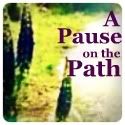My messy house is the nest in which meaningful moments are carved out with children who are growing up way too fast. Busy days are filled to the brim with more important tasks than dishes and laundry, but I still sigh at the unfinished homemaking chores at the end of the day. I watch my kids running across the troll bridge in the autumn afternoon sun, and I breathe deep the crisp air, but half of my mind is on grading unfinished and schoolwork they're not doing and all the busywork I used to measure my worth by.
I've been a griever, a lamenter, a mourner for as long as I can remember. My childhood held a hidden pain too deep for me to understand, and twenty lifetimes of pain shoved in to my formative years billowed out in weird ways: I found things to cry about because I had to cry and I couldn't cry about what I needed to cry about. Now the well of pain is too deep to tap so I leave the cover on most days but still the pain aches there inside despite the gathering of joys and the counting of blessings I've made it a habit to do.
How does one go about healing wounds when it hurts so to peel the bandage back? When it's festered so long, it seems easier to pretend it's been amputated long ago. I guess that's why I run away so often. Run away from failure headlong into small adventures, like drives into the country to count the rails on a track with my train-crazy son. Like last-blast fully clothed afternoons at a splash pad, with all the other moms looking at me like I'm crazy, they fully prepared with their beach towels and their kids in swimsuits and goggles, and mine the crazy lady's kids dripping wet in jeans and t-shirts.
I don't know, really, if I'm teaching them to be spontaneous joy addicts or just social outcasts. I don't know if I'm teaching them the same bottling-up-pain coping I employ or if I'm showing them that you can salvage something out of a day lost to that deep ache after all. All I know is when the day ends, we are all smiling. The kitchen is still messy, but we're laughing in bed together under the comforter watching The Voice and trying to guess who's going to win the latest vocal battle. I haven't solved any of my real problems, I suppose, but I've enjoyed life anyway. Lived it. This day I lived. This day I smiled. This day I wasn't crushed by the granite boulder of a prisoner's existence. Today I was free for a while. Today I forgot for a time.
I'm trying to believe this is what it means to grasp the Promise - that I'm washed clean as snow, that all my past is forgotten in the outpouring of Love from the Cross. If He remembers it no more, do I really have to (Isaiah 43:25)? Do I have to go back there? Do I have to unleash those sorrows, work through them to truly be free of them? Or can I just shrug them off like old clothes, put on the new ones He's offered me (Colossians 3)? It is a crazy life, this Saved life, isn't it? Who cares if people stare? I don't have to drown in the pool of my suffering, because He's pulled me out of the mire and muck, and even if my glass is half empty for the rest of my life - the beauty of it is, that means it's still half full.



